Action 4 Noel and PCRF visit Cork Cancer Research Centre
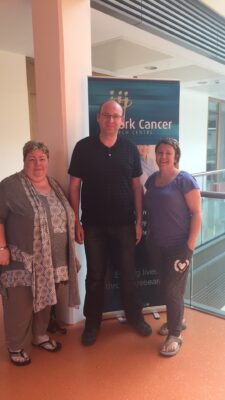
Kerry Irvine, who is our regional rep for Northern Ireland and founder of Pancreatic Cancer Action : Action4Noel, travelled with Susan Cooke NI regional rep for Pancreatic Cancer Research Fund, travelled to Cork University Research Centre to find out more about the research Dr Patrick Forde and his team are doing into pancreatic cancer.
The Centre is using investigating pancreatic cancer using electroporation, which is a ‘cell-permeabilizing technology that renders the treated cell membranes permeable to otherwise impermeant or poorly permeant drugs.’
Here Kerry and Susan both share their experience of visiting the centre. Also, Dr Patrick Forde, and his research assistant, Philana Fernandes.
Kerry Irvine – Regional rep PCA Founder Action4Noel
I was very keen to visit Cork after Dr Patrick Forde so kindly travelled to the Mater Hospital to attend a PCASni meeting to discuss his current research. PCRF & Action4Noel have been working so closely together here in NI the last year raising awareness & fundraising together the trip abled us to see what our efforts were being used for. So on Friday 3 June Susan Cooke, Liz McCauley & I set off for Cork University Cancer research Centre to meet with Dr Patrick Forde & Philana Fernandes.
Patrick & Philana a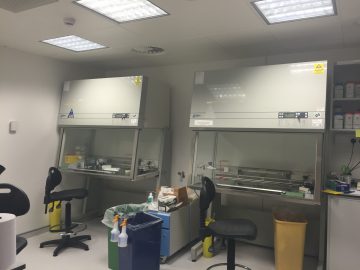 re very dedicated to their jobs and that shone through in the way they both presented their work to us,especially on a hot Friday afternoon that was a bank holiday weekend. I am not medically trained at all so it was amazing to hear about the research in a way that I could understand. Seeing the facilities at Cork hearing about their amazing work really cemented for me that early diagnosis & research really do have to go hand in hand.
re very dedicated to their jobs and that shone through in the way they both presented their work to us,especially on a hot Friday afternoon that was a bank holiday weekend. I am not medically trained at all so it was amazing to hear about the research in a way that I could understand. Seeing the facilities at Cork hearing about their amazing work really cemented for me that early diagnosis & research really do have to go hand in hand.
It was a great surprise to meet Eoghan O’Sullivan from Breakthrough Cancer. O’Sullivan when explaining their work to us it came to light that PCA are working with them on another exciting project that will help PC patients.
I look forward to welcoming Patrick, Philana & Eoghan to Belfast at Stormont November 1st when Action4Noel are hosting an event in the Long Gallery sponsored by Mr Thomas Buchannan who has been a constant source of support for us.
Finally thank you to everyone that made the visit possible.
Susan Cooke – Regional rep PCRF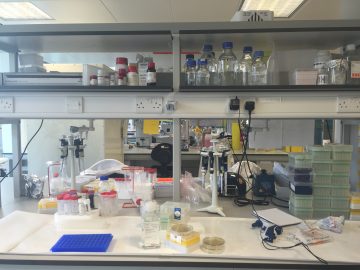
On Friday 3rd June 2016 I along with Kerry Irvine and Liz McCauley set off on a 6 hour road trip to Cork University Cancer Research Centre for a visit with Dr Patrick Forde and team. Following a short stop at Kildare shopping village for some lunch (no shopping) we arrived at our destination and were met by Patrick who took us on a tour of the facility. The research centre is a fantastic, modern facility and we were all very impressed with the layout and lab set ups. Both Patrick and Philana who is the research assistant on the PCRF funded project took time to explain the work they were doing and what they hoped to achieve. Patrick also gave us some exciting news which we hope to be able to share very soon!!
Following our tour both Patrick and Philana accompanied us to meet Eoghan O’Sullivan from Breakthrough Cancer a charity who partner the research centre and fundraise to support its work. Again we received another warm welcome and look forward to returning the hospitality when Eoghan, Patrick and Philana visit Belfast!! The photo of the signed Ireland shirt will remain our secret!!
It was wonderful to not only to meet the PCRF team but also the other researchers involved in various projects that have such passion and determination to beat cancer. Despite it being a beautiful hot Friday evening on a bank holiday weekend they were still working hard and willing to give up their time to spend it with us and we are very grateful.
Dr Patrick Forde – Researcher at Cork Cancer Research Centre
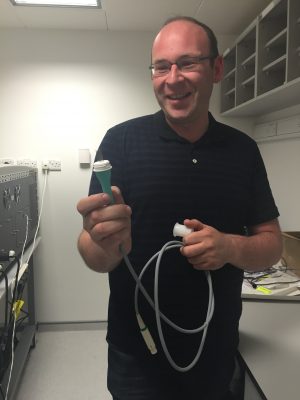
For our research at Cork we are using a technology called electroporation. Electroporation is the use of optimized electric pulses that when applied to cancer cells it creates pores/holes in the cell membrane and after a period they reseal again. When combined with chemotherapy this allows for efficient delivery of the chemotherapy into the cancer cell. When the pores are open the drug goes inside the cell, after a period the pores close and traps the drug inside the cancer and the drug is able to act more efficiently. This makes the chemotherapy more efficiently and allows for reduced chemotherapy needed which reduces the side effects of conventional chemotherapy. CCRC has being using this therapy as treatment for external cancers and now want to develop it for other cancer types such as pancreatic cancer.
This is a very targeted therapy and localizes the effect to only the tumour that the electric energy is delivered to. It is a very effective therapy but limited to the treatment area. We want to develop this to target all cancer cells in the body.
Immunogenic cell death is a type of cell death that recruits an anti-tumour cell death. This type of cell death occurs and releases proteins called DAMPS (Danger-associated molecular patterns) from dying cells only. These proteins have the ability to activate an anti-tumour immune response and help make the bodies own immune system to identify all cancer cells as foreign.
We have observed an immune response being recruited to the tumour site post electroporation. But this immune system is inactive. We want to identify the type of immunogenic cell death being generated. Determine the DAMP protein fingerprint being released from the treated cancer cell and enhance the anti-tumour immune response by modulating this immune system with candidate new immunotherpy modulators. Thus harnessing the bodies own immune system to target all cancer cells. Making the electroporation technology a systemic therapy. Therefore our aim is to develop a combination therapy that will target both primary and secondary pancreatic cancer
Philana Fernandes – Research Assistant at Cork Cancer Research Centre
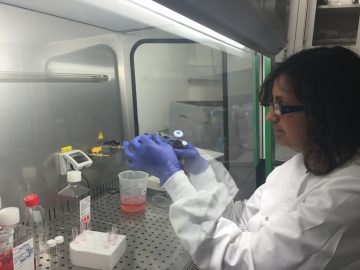
Having worked on prostate and colon cancer in the past, I was struck by the fact that despite there being no treatment option which demonstrates long-term benefit for the majority of pancreatic cancer patients, there is very little research being carried out on pancreatic cancer worldwide.
My interest was piqued when I saw that Patrick was looking for someone to investigate pancreatic cancer using what seemed to be an unusual method – electro chemotherapy. Electroporation is a cell-permeabilizing technology that renders the treated cell membranes permeable to otherwise impermeant or poorly permeant drugs. Delivering chemotherapy by electroporation is known as electro chemotherapy or ECT. ECT is an innovative method for drug delivery and results in a potent, yet local, chemo toxic effect. The potential difference this will make for pancreatic cancer in particular is huge as this type of tumour is very hard and has a poor blood supply which probably explains the lack of success of chemotherapy with this disease to date.
Furthermore, initial investigations by the CCRC and others have suggested that cells dying as a result of delivering chemotherapeutics in this manner stimulate the body’s own anti-cancer response. This immune response following ECT can aid in the eradication of the primary tumour and, crucially, also of distal metastases. What’s even more exciting is the use of ECT in combination with immune modulators. These drugs are used to overcome the immune suppression that the cancer orchestrates. By using them in combination with ECT, we will potentially be able to effectively target both the primary pancreatic tumour and the pancreatic micro metastatic disease. I am very privileged to be working in this exciting area an especially within the CCRC, as we will hopefully be able to translate our findings to patients in the very near future.